Examining Book of Ezekiel 2
Mike Ervin
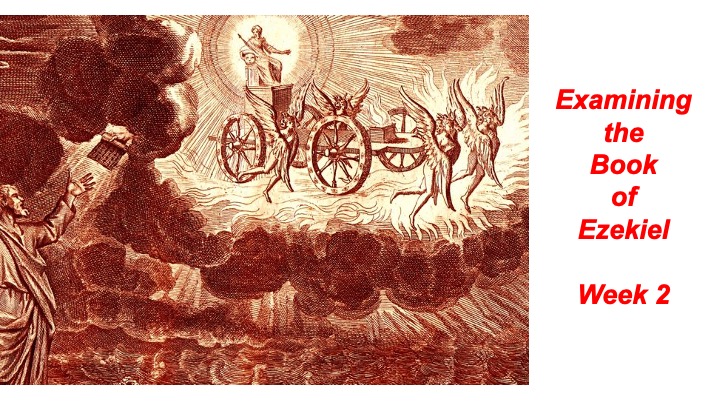
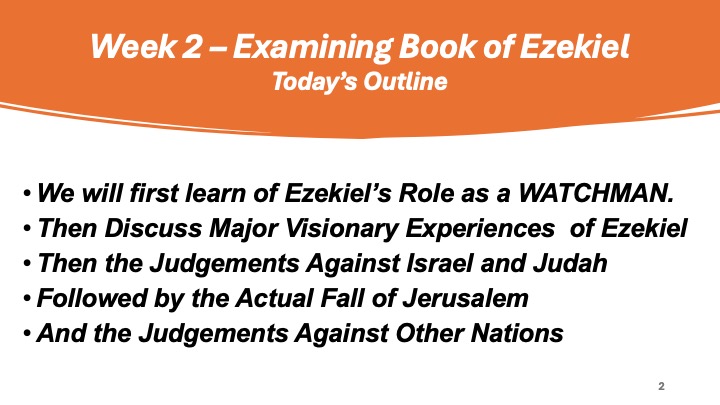
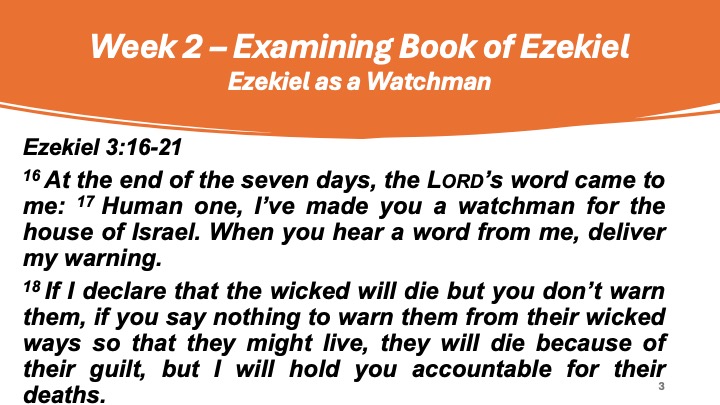
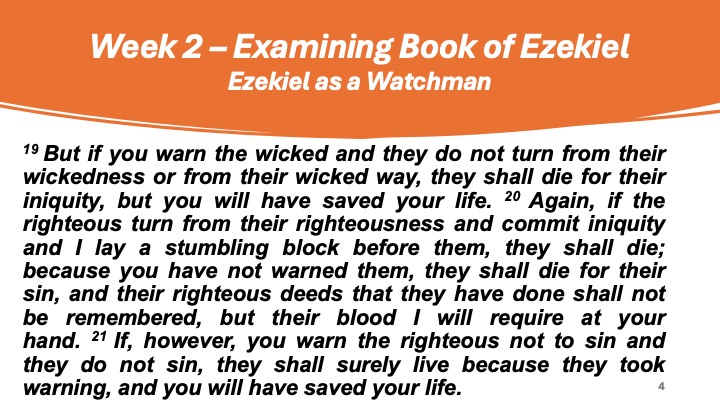
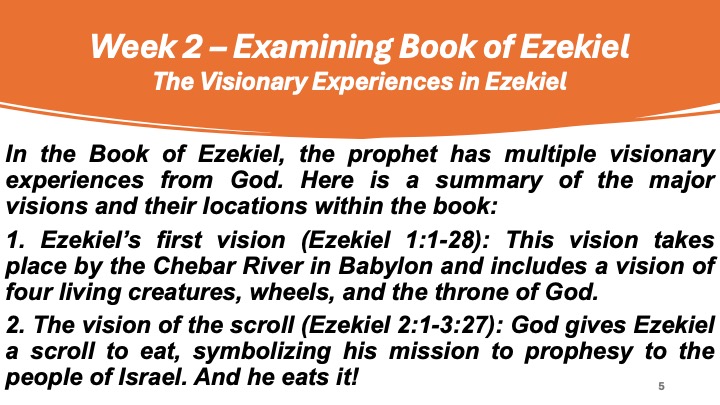
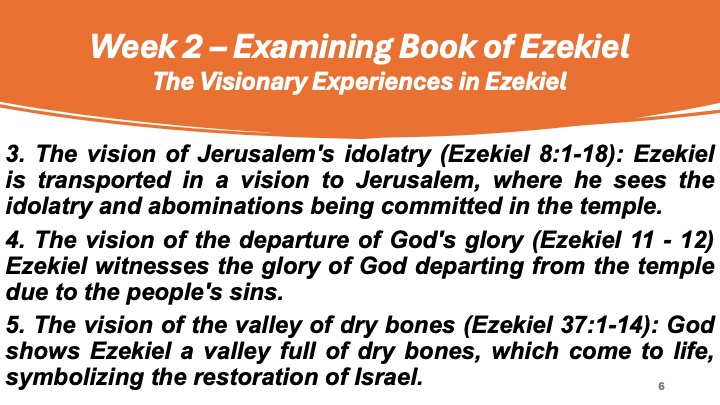
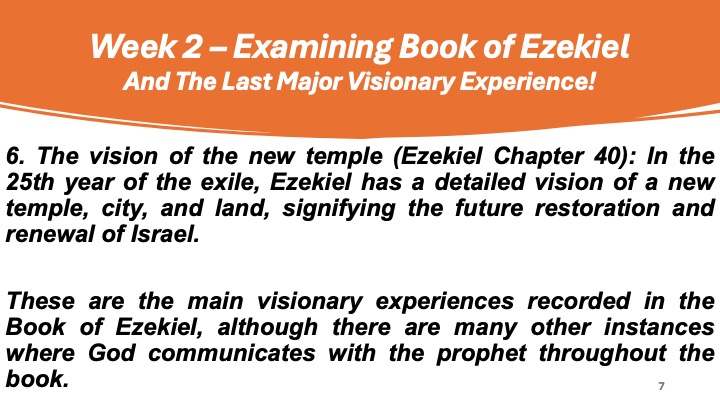
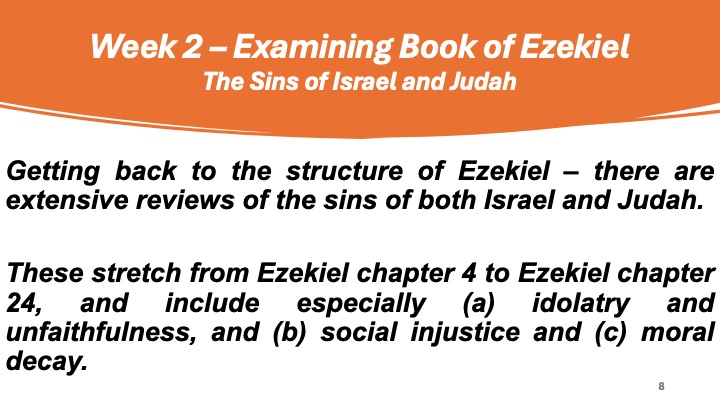
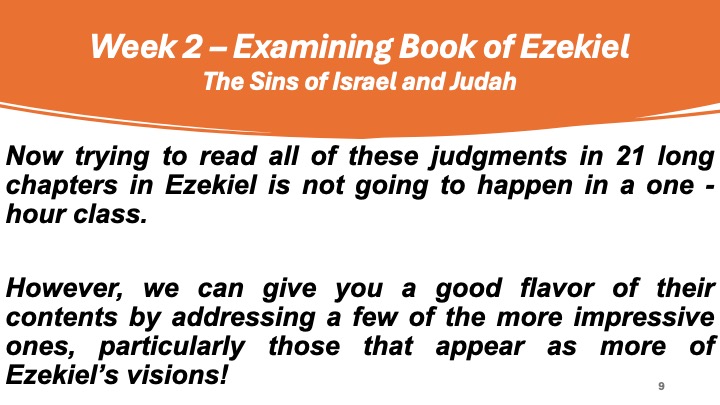
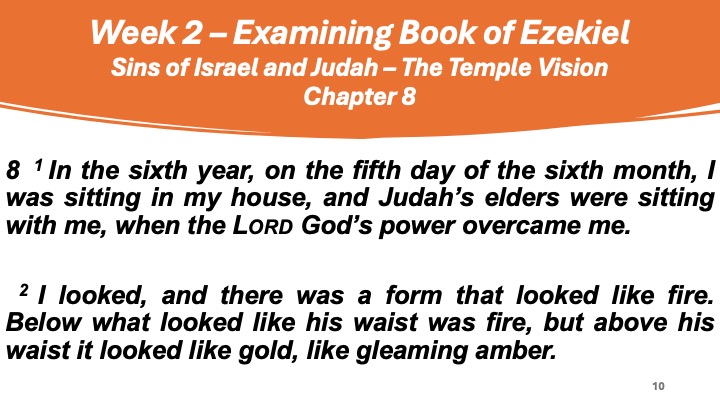
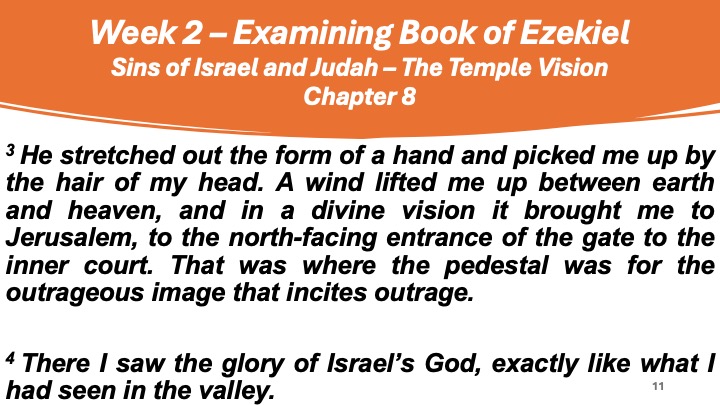
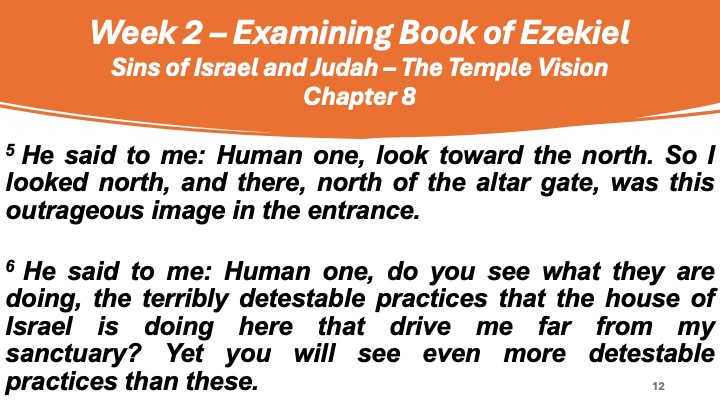
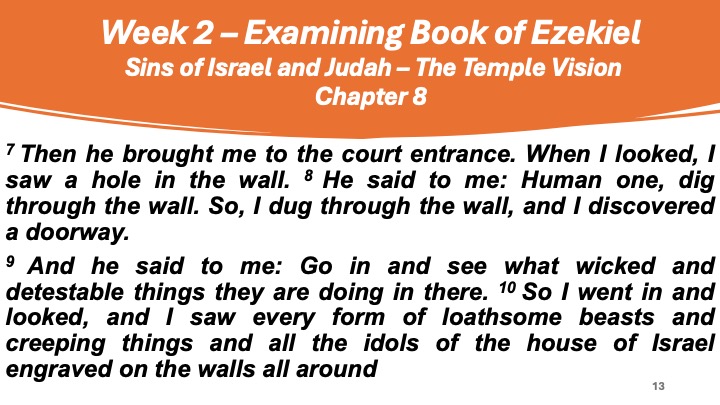
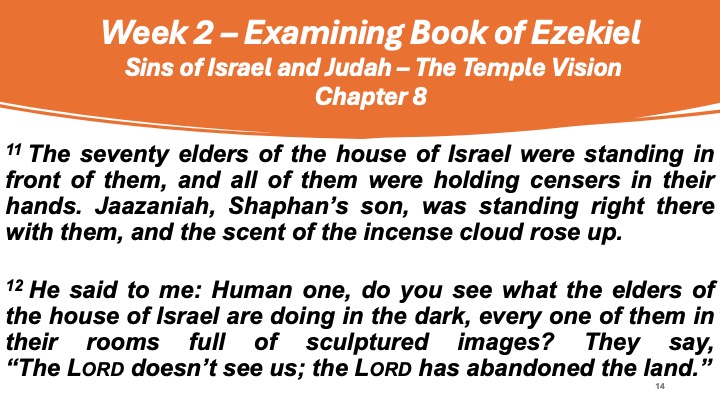
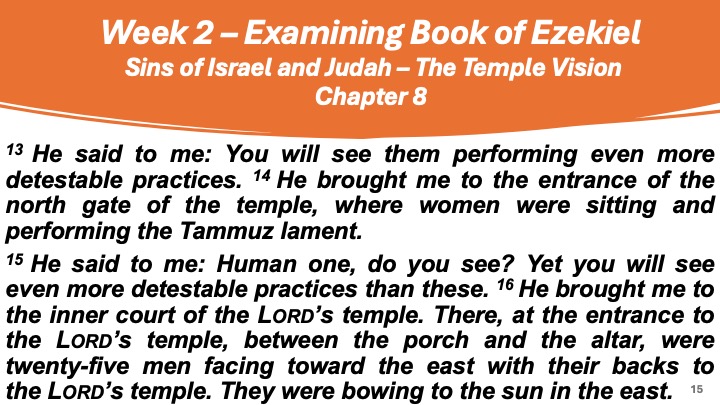
The Tammuz lament, mentioned in the Book of Ezekiel, refers to an ancient Mesopotamian religious ritual mourning the death of the god Tammuz (also known as Dumuzi). Tammuz was believed to be a god of vegetation and fertility who died and was resurrected annually, representing the cycle of the seasons and the death and rebirth of crops. In Ezekiel 8:14, the prophet Ezekiel is shown a vision of women sitting at the entrance of the north gate of the Temple, weeping for Tammuz. This passage is a criticism of the Israelites who had adopted this pagan ritual, which was seen as a form of idolatry and a violation of their covenant with God. The Tammuz lament is not explicitly mentioned elsewhere in the Bible.
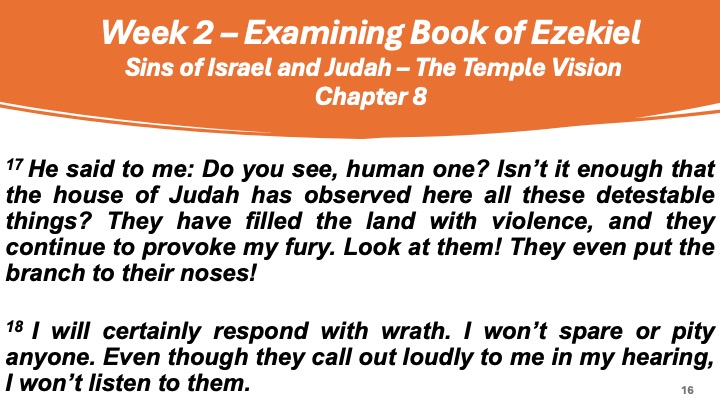
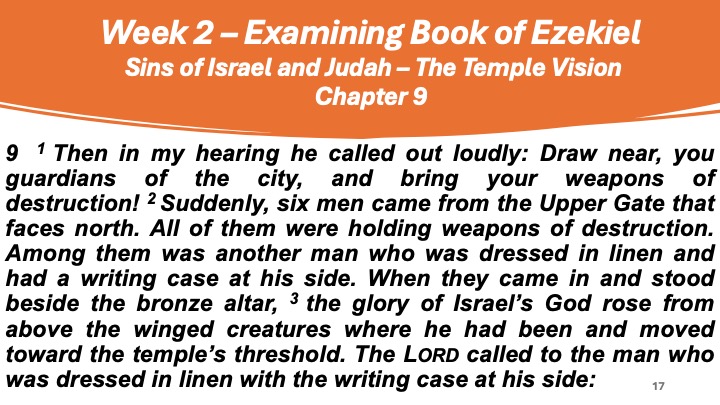
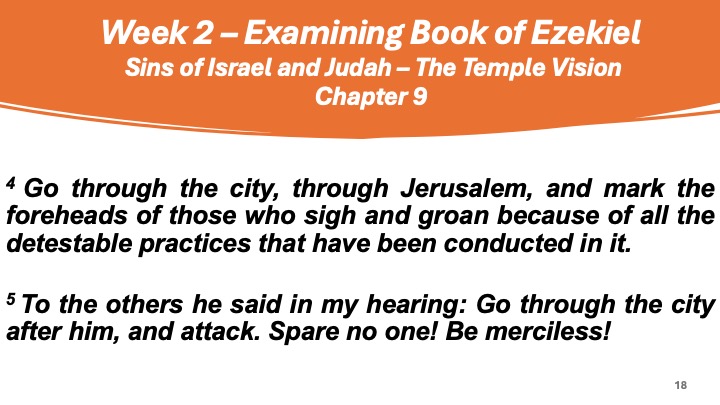
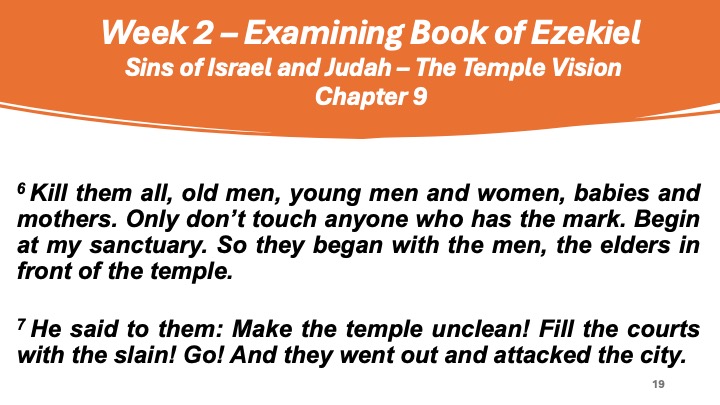
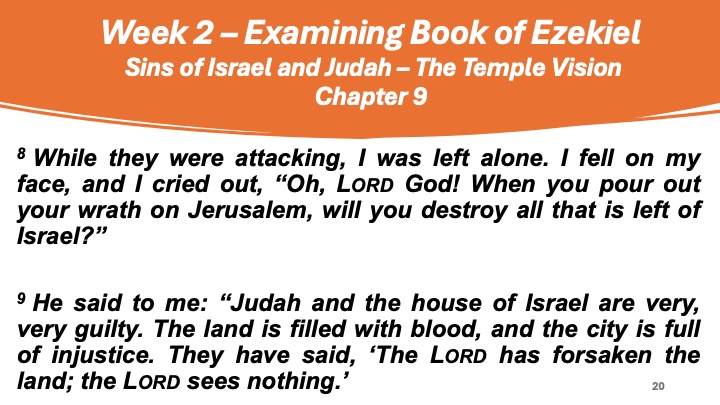
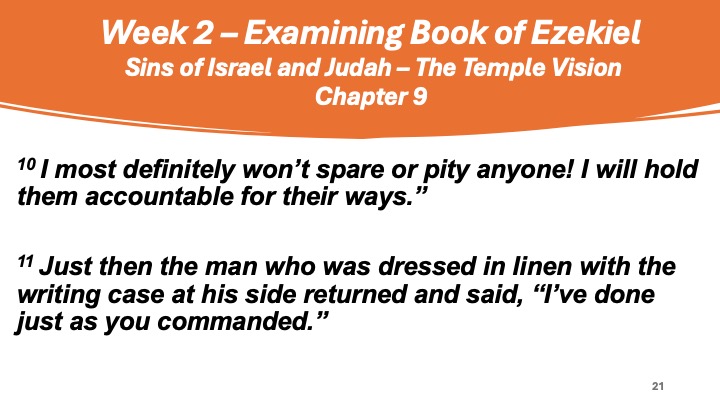
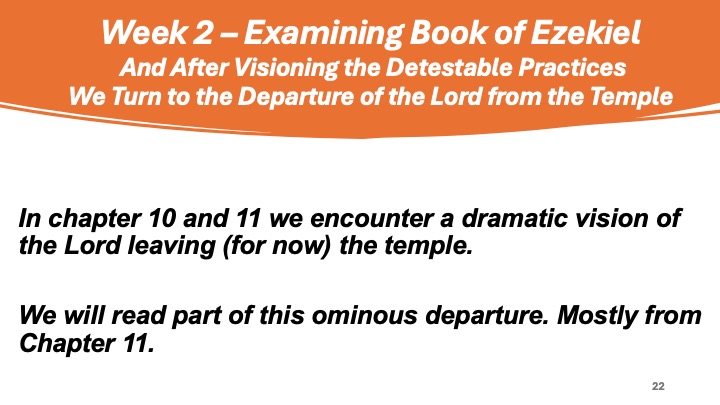
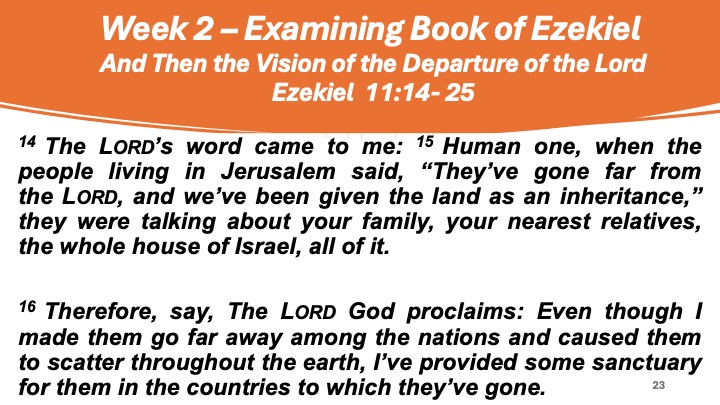
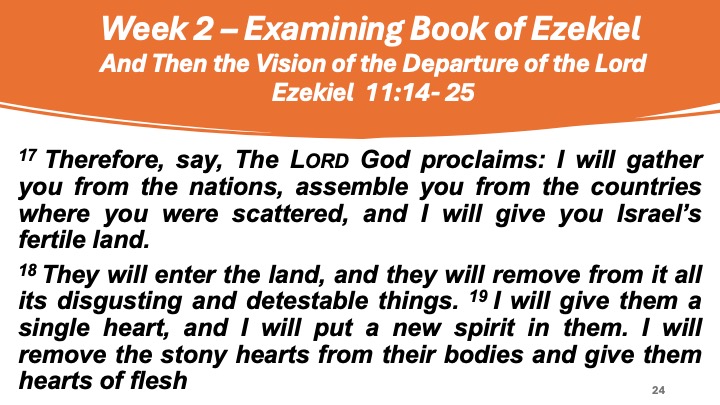
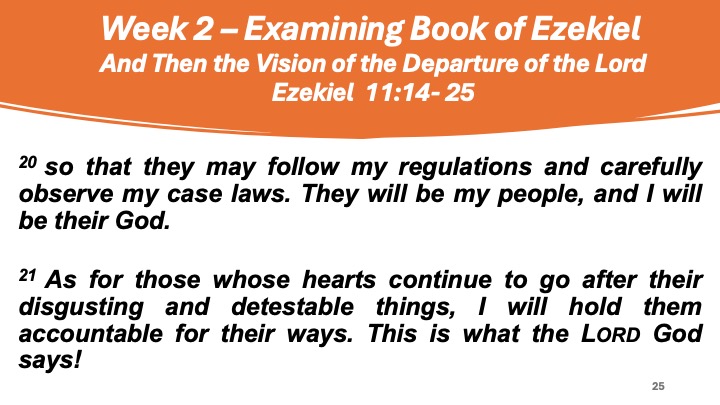
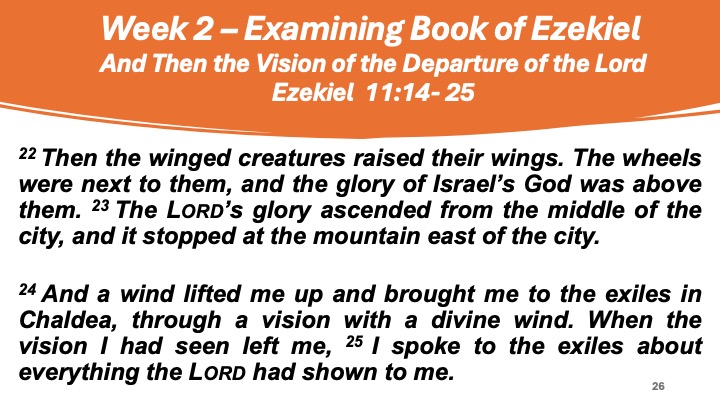
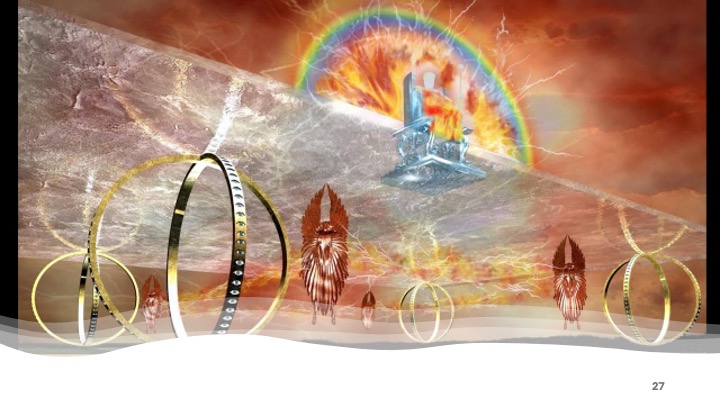
And here we see another artist’s rendering of the departure of the Lord from the temple.
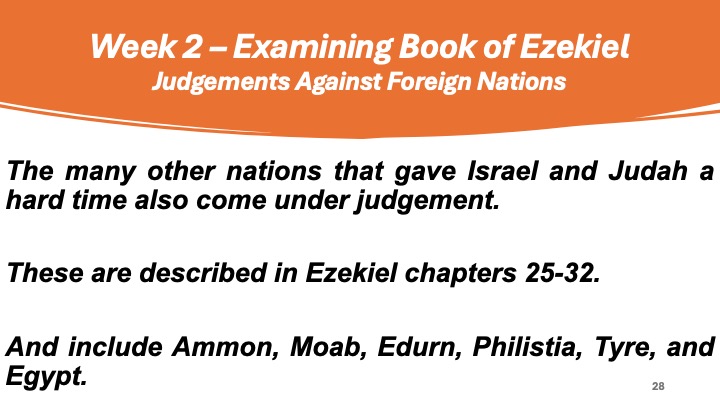
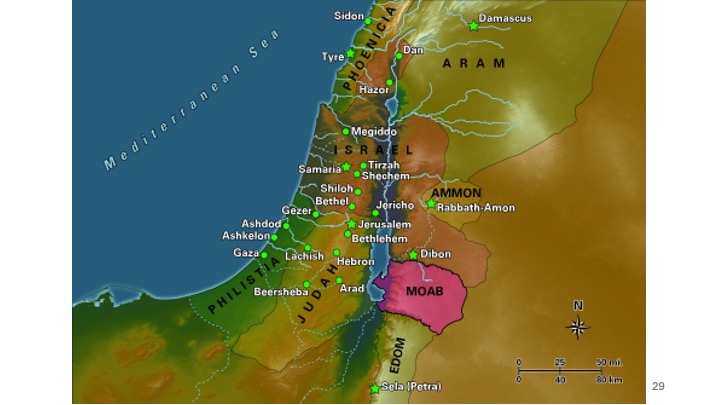
And a map that shows all of these foreign nations. Egypt to the south. Edom, Moab, Ammon to the east (in present day Jordan). Tyre north of Israel (Phoenicia). We will focus on Ammon, Moab, Edom, and Philistia (present day Gaza).
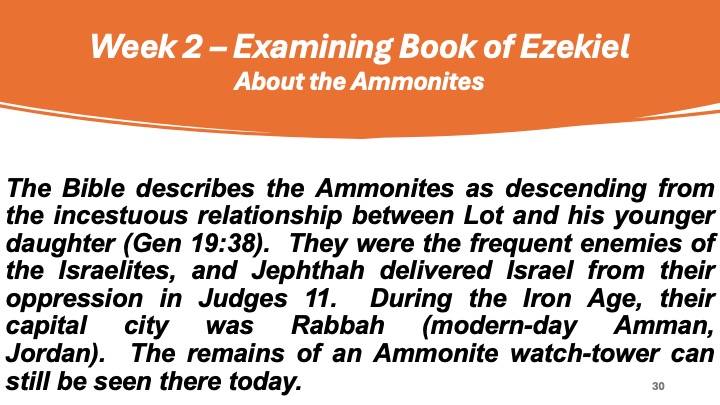
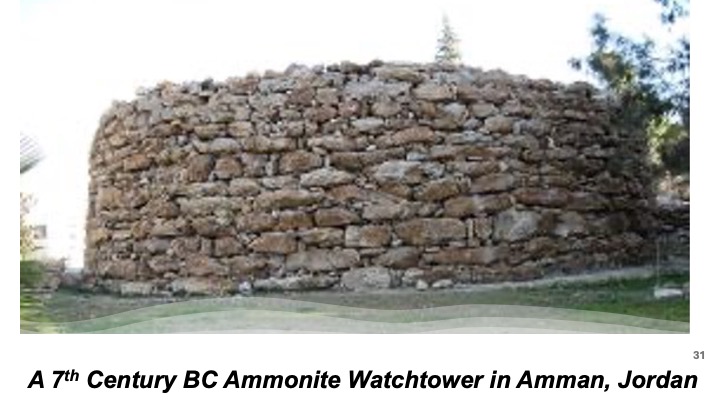
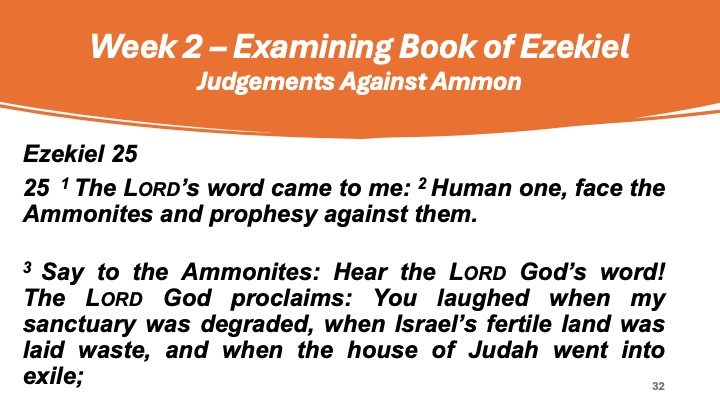
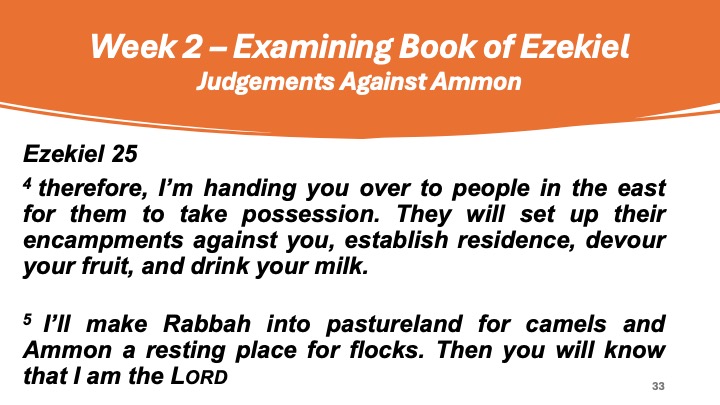
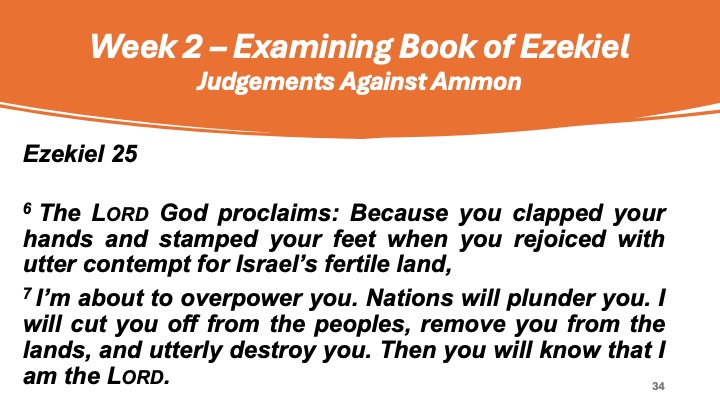
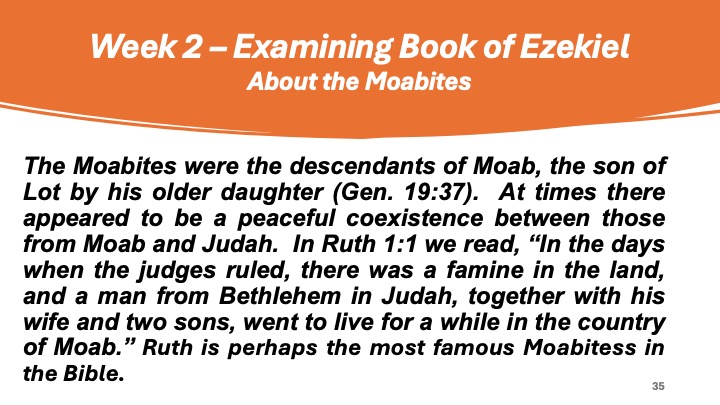
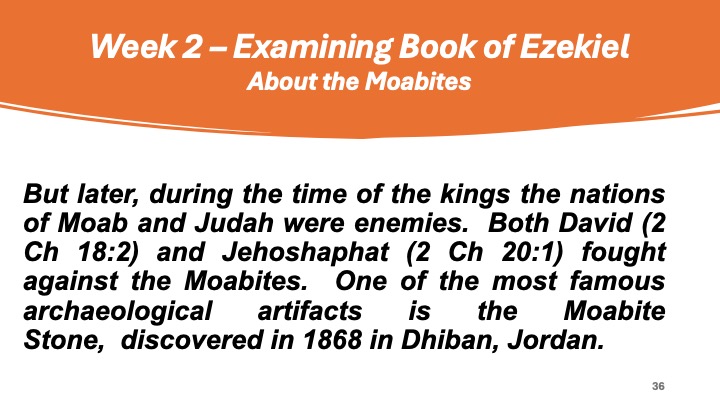
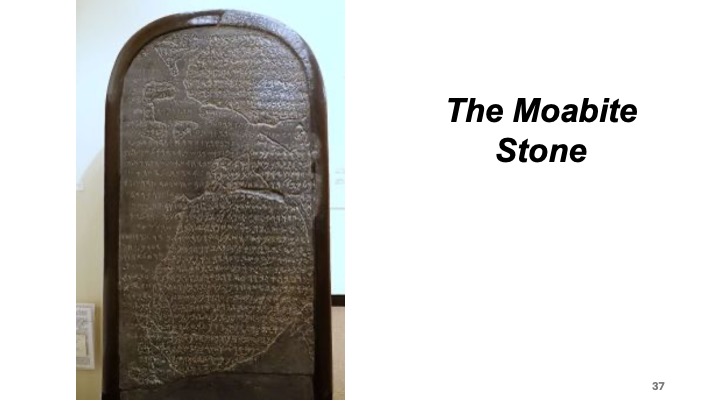
The Mesha Stele, also known as the Moabite Stone, is a stele dated around 840 BCE containing a significant Canaanite inscription in the name of King Mesha of Moab (a kingdom located in modern Jordan). Mesha tells how Chemosh, the god of Moab, had been angry with his people and had allowed them to be subjugated to the Kingdom of Israel, but at length, Chemosh returned and assisted Mesha to throw off the yoke of Israel and restore the lands of Moab. Mesha also describes his many building projects.[1] It is written in a variant of the Phoenician alphabet, closely related to the Paleo-Hebrew script.
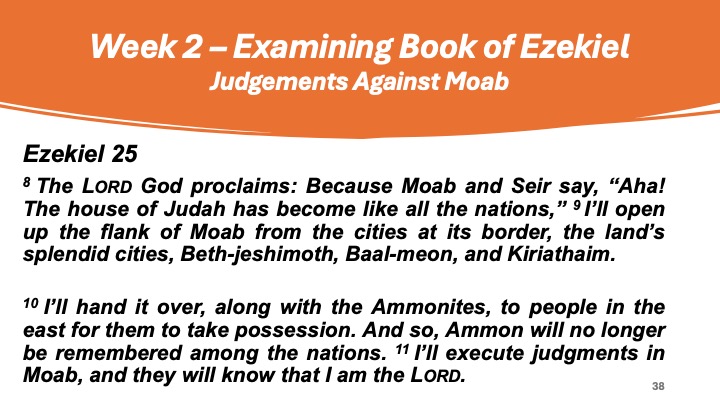
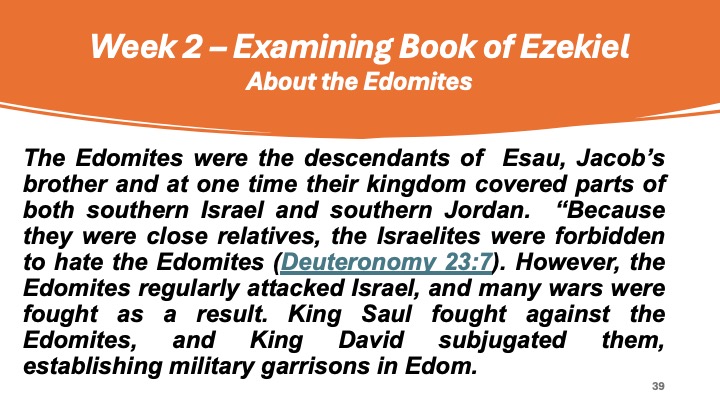
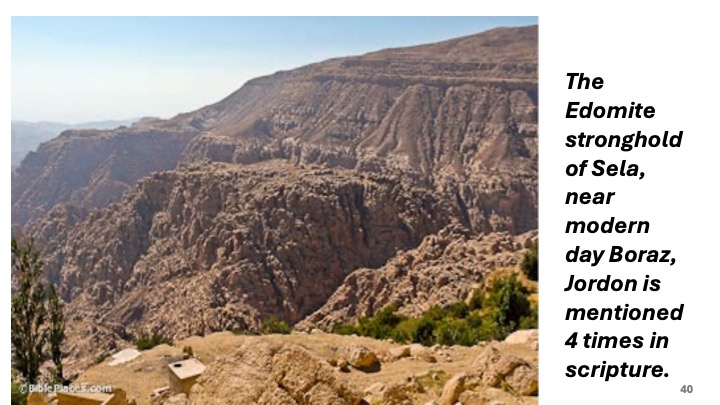
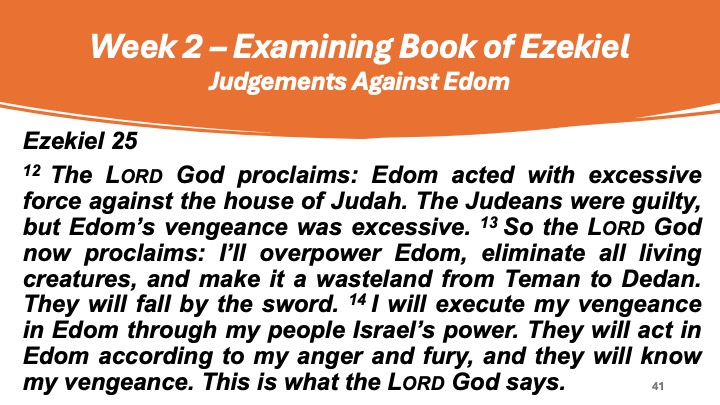
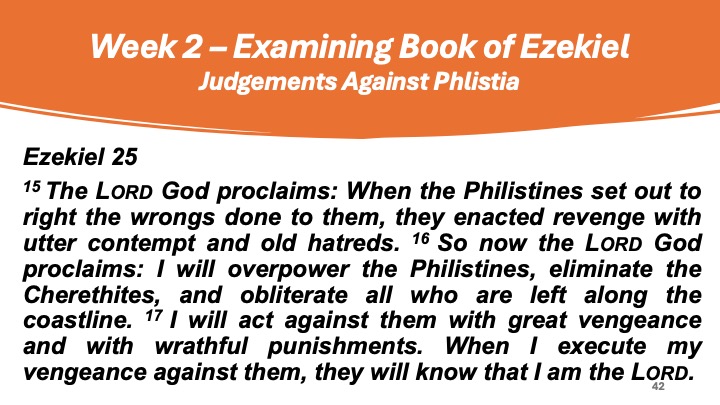
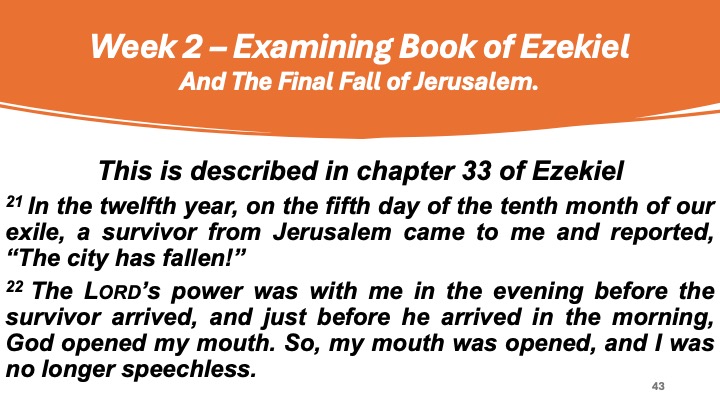
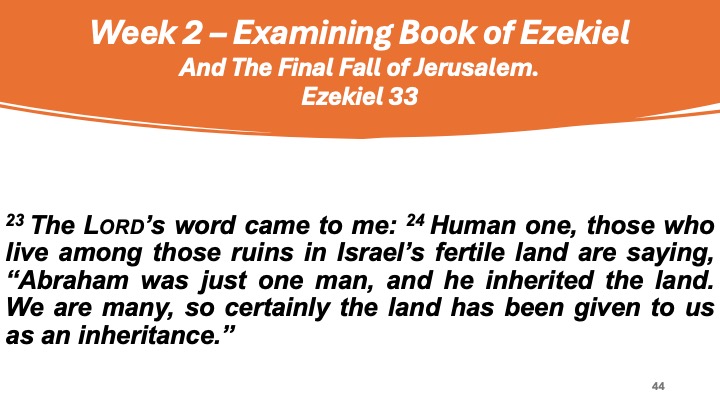
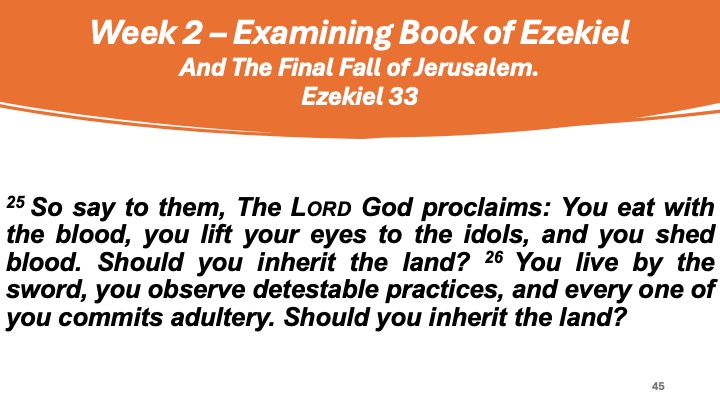
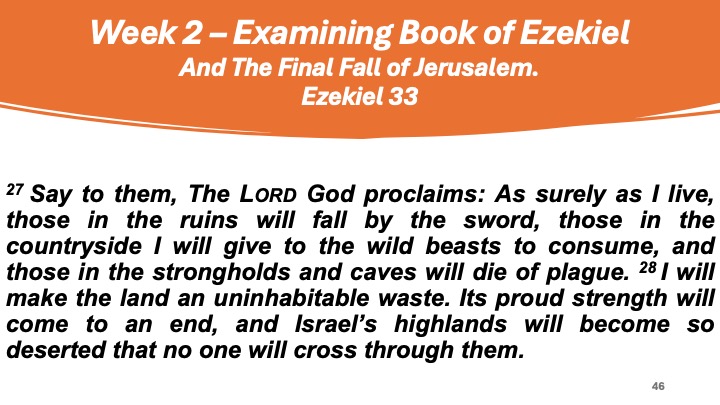
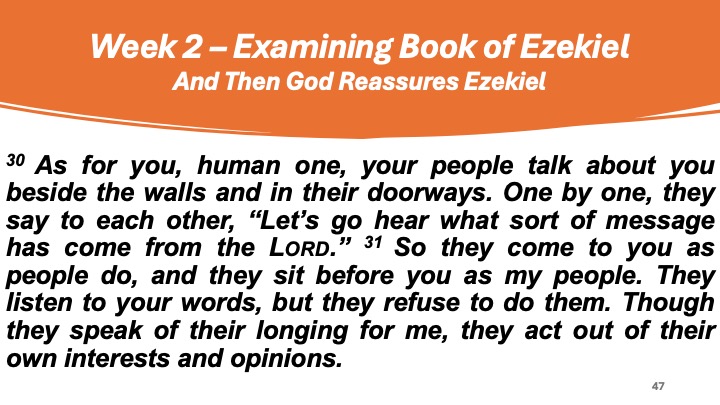
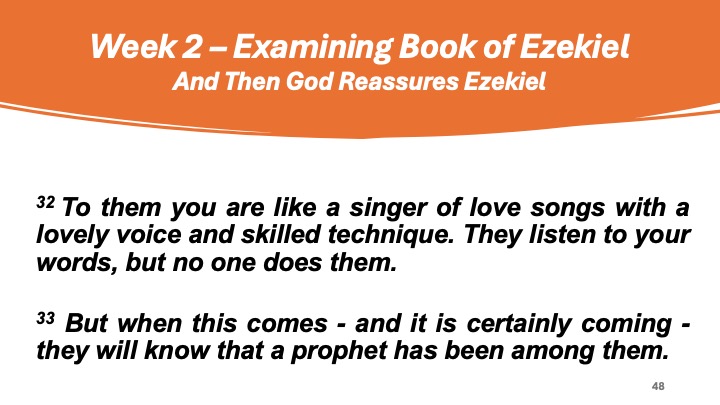
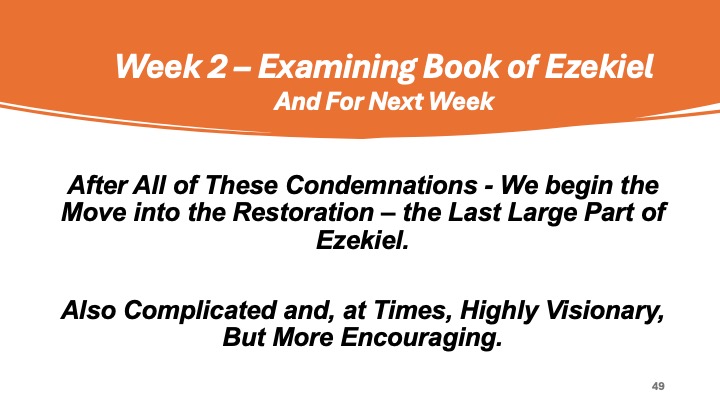
Examining Book of Ezekiel 2
Links
< Home Page > < Examining Ezekiel Menu > < Top of Page >
Examining the Book of Ezekiel 2 Text
Examining the Book of Ezekiel – the Week 2 Text
We now move into week 2 of Examining the Book of Ezekiel. You may recall from seeing this artist rendering of Ezekiel’s visionary experience in chapter 1 of Ezekiel of Ezekiel’s description in Chapter 1 while on the banks of the Chebar River in Babylon where he was a captive of King Nebuchadnezzar II and the Neo– Babylon empire and he described in some detail of seeing what he called the Glory of God. It was a rather startling view of four winged creatures having four heads facing in four directions and somehow connected to wheels. This particular artist visioned this as a chariot driving a throne having a human like figure sitting on that throne. And Ezekiel portrayed the human like figure on the throne as “the Glory of the Lord”. I repeat it here because this particular vision repeats itself several more times as we continue examining the book of Ezekiel.
So as we proceed in weeks 2 of Examining the Book of Ezekiel let’s look at a brief outline of week 2.
Week 2 – Examining Book of Ezekiel
Today’s Outline
• We will first learn of Ezekiel’s Role as a WATCHMAN.
• Then Discuss Major Visionary Experiences of Ezekiel
• Then the Judgements Against Israel and Judah
• Followed by the Actual Fall of Jerusalem
• And the Judgements Against Other Nations
And we begin with the interesting description of Ezekiel’s role as WATCHMAN for Israel and Judah. It is described in Ezekiel 3:16-21
16 At the end of the seven days, the Lord’s word came to me: 17 Human one, I’ve made you a watchman for the house of Israel. When you hear a word from me, deliver my warning.
18 If I declare that the wicked will die but you don’t warn them, if you say nothing to warn them from their wicked ways so that they might live, they will die because of their guilt, but I will hold you accountable for their deaths.
19 But if you warn the wicked and they do not turn from their wickedness or from their wicked way, they shall die for their iniquity, but you will have saved your life. 20 Again, if the righteous turn from their righteousness and commit iniquity and I lay a stumbling block before them, they shall die; because you have not warned them, they shall die for their sin, and their righteous deeds that they have done shall not be remembered, but their blood I will require at your hand. 21 If, however, you warn the righteous not to sin and they do not sin, they shall surely live because they took warning, and you will have saved your life.
We have already talked quite a bit about the visionary experiences of Ezekiel but here is a summary of what many scholar’s call the 6 major visionary experiences: The first 2 were covered in week 1 of examining the book of Ezekiel.
1. Ezekiel’s first vision (Ezekiel 1:1-28): This vision takes place by the Chebar River in Babylon and includes a vision of four living creatures, wheels, and the throne of God.
2. The vision of the scroll (Ezekiel 2:1-3:27): God gives Ezekiel a scroll to eat, symbolizing his mission to prophesy to the people of Israel. And he eats it!
3. The vision of Jerusalem's idolatry (Ezekiel 8:1-18): Ezekiel is transported in a vision to Jerusalem, where he sees the idolatry and abominations being committed in the temple.
4. The vision of the departure of God's glory (Ezekiel 11 - 12) Ezekiel witnesses the glory of God departing from the temple due to the people's sins.
5. The vision of the valley of dry bones (Ezekiel 37:1-14): God shows Ezekiel a valley full of dry bones, which come to life, symbolizing the restoration of Israel.
6. The vision of the new temple (Ezekiel Chapter 40): In the 25th year of the exile, Ezekiel has a detailed vision of a new temple, city, and land, signifying the future restoration and renewal of Israel.
These are the main visionary experiences recorded in the Book of Ezekiel, although there are many other instances where God communicates with the prophet throughout the book.
We will experience all six of these in our 4 weeks of Examining the Book of Ezekiel.
The Sins of Israel and Judah
Getting back to the structure of Ezekiel – there are extensive reviews of the sins of both Israel and Judah. These stretch from Ezekiel chapter 4 to Ezekiel chapter 24, and include especially (a) idolatry and unfaithfulness, and (b) social injustice and (c) moral decay.
Now trying to read all of these judgments in 21 long chapters in Ezekiel is not going to happen in even a four - week class of examining the book of Ezekiel. However, we can give you a good flavor of their contents by addressing a few of the more impressive ones, particularly those that appear as more of Ezekiel’s visions!
And moving onto Chapter 8 of Ezekiel we experience the Temple Vision:
8 1 In the sixth year, on the fifth day of the sixth month, I was sitting in my house, and Judah’s elders were sitting with me, when the Lord God’s power overcame me.
2 I looked, and there was a form that looked like fire. Below what looked like his waist was fire, but above his waist it looked like gold, like gleaming amber.
He is describing once again the human - like figure sitting on the throne above the winged creatures. The glory of the Lord.
3 He stretched out the form of a hand and picked me up by the hair of my head. A wind lifted me up between earth and heaven, and in a divine vision it brought me to Jerusalem, to the north-facing entrance of the gate to the inner court. That was where the pedestal was for the outrageous image that incites outrage. 4 There I saw the glory of Israel’s God, exactly like what I had seen in the valley.
5 He said to me: Human one, look toward the north. So I looked north, and there, north of the altar gate, was this outrageous image in the entrance. 6 He said to me: Human one, do you see what they are doing, the terribly detestable practices that the house of Israel is doing here that drive me far from my sanctuary? Yet you will see even more detestable practices than these.
7 Then he brought me to the court entrance. When I looked, I saw a hole in the wall. 8 He said to me: Human one, dig through the wall. So, I dug through the wall, and I discovered a doorway. 9 And he said to me: Go in and see what wicked and detestable things they are doing in there. 10 So I went in and looked, and I saw every form of loathsome beasts and creeping things and all the idols of the house of Israel engraved on the walls all around.
11 The seventy elders of the house of Israel were standing in front of them, and all of them were holding censers in their hands. Jaazaniah, Shaphan’s son, was standing right there with them, and the scent of the incense cloud rose up. 12 He said to me: Human one, do you see what the elders of the house of Israel are doing in the dark, every one of them in their rooms full of sculptured images? They say, “The Lord doesn’t see us; the Lord has abandoned the land.”
13 He said to me: You will see them performing even more detestable practices. 14 He brought me to the entrance of the north gate of the temple, where women were sitting and performing the Tammuz lament.
15 He said to me: Human one, do you see? Yet you will see even more detestable practices than these. 16 He brought me to the inner court of the Lord’s temple. There, at the entrance to the Lord’s temple, between the porch and the altar, were twenty-five men facing toward the east with their backs to the Lord’s temple. They were bowing to the sun in the east.
17 He said to me: Do you see, human one? Isn’t it enough that the house of Judah has observed here all these detestable things? They have filled the land with violence, and they continue to provoke my fury. Look at them! They even put the branch to their noses! 18 I will certainly respond with wrath. I won’t spare or pity anyone. Even though they call out loudly to me in my hearing, I won’t listen to them.
And then on to Chapter 9 – the temple vision continues:
9 1 Then in my hearing he called out loudly: Draw near, you guardians of the city, and bring your weapons of destruction! 2 Suddenly, six men came from the Upper Gate that faces north. All of them were holding weapons of destruction. Among them was another man who was dressed in linen and had a writing case at his side. When they came in and stood beside the bronze altar, 3 the glory of Israel’s God rose from above the winged creatures where he had been and moved toward the temple’s threshold. The Lord called to the man who was dressed in linen with the writing case at his side:
4 Go through the city, through Jerusalem, and mark the foreheads of those who sigh and groan because of all the detestable practices that have been conducted in it. 5 To the others he said in my hearing: Go through the city after him, and attack. Spare no one! Be merciless!
6 Kill them all, old men, young men and women, babies and mothers. Only don’t touch anyone who has the mark. Begin at my sanctuary. So they began with the men, the elders in front of the temple. 7 He said to them: Make the temple unclean! Fill the courts with the slain! Go! And they went out and attacked the city.
8 While they were attacking, I was left alone. I fell on my face, and I cried out, “Oh, Lord God! When you pour out your wrath on Jerusalem, will you destroy all that is left of Israel?”
9 He said to me: “Judah and the house of Israel are very, very guilty. The land is filled with blood, and the city is full of injustice. They have said, ‘The Lord has forsaken the land; the Lord sees nothing. 10 I most definitely won’t spare or pity anyone! I will hold them accountable for their ways.”
11 Just then the man who was dressed in linen with the writing case at his side returned and said, “I’ve done just as you commanded.”
And as we march next to chapter 10 and 11 we encounter the ominous departure of the Lord from the Temple. We will read a prt of that departure – mostly from chapter 11. Ezekiel 11:14-25
14 The Lord’s word came to me: 15 Human one, when the people living in Jerusalem said, “They’ve gone far from the Lord, and we’ve been given the land as an inheritance,” they were talking about your family, your nearest relatives, the whole house of Israel, all of it.
16 Therefore, say, The Lord God proclaims: Even though I made them go far away among the nations and caused them to scatter throughout the earth, I’ve provided some sanctuary for them in the countries to which they’ve gone. 17 Therefore, say, The Lord God proclaims: I will gather you from the nations, assemble you from the countries where you were scattered, and I will give you Israel’s fertile land.
18 They will enter the land, and they will remove from it all its disgusting and detestable things. 19 I will give them a single heart, and I will put a new spirit in them. I will remove the stony hearts from their bodies and give them hearts of flesh 20 so that they may follow my regulations and carefully observe my case laws. They will be my people, and I will be their God.
21 As for those whose hearts continue to go after their disgusting and detestable things, I will hold them accountable for their ways. This is what the Lord God says!
An then the Actual Departure
22 Then the winged creatures raised their wings. The wheels were next to them, and the glory of Israel’s God was above them. 23 The Lord’s glory ascended from the middle of the city, and it stopped at the mountain east of the city.
24 And a wind lifted me up and brought me to the exiles in Chaldea, through a vision with a divine wind. When the vision I had seen left me, 25 I spoke to the exiles about everything the Lord had shown to me.
And then we come in chapter 25 to judgements against foreign nations. The many other nations that gave Israel and Judah a hard time also come under judgement. These are described in Ezekiel chapters 25-32. And include Ammon, Moab, Edurn, Philistia, Tyre, and Egypt.
About the Ammonites
The Bible describes the Ammonites as descending from the incestuous relationship between Lot and his younger daughter (Gen 19:38). They were the frequent enemies of the Israelites, and Jephthah delivered Israel from their oppression in Judges 11. During the Iron Age, their capital city was Rabbah (modern-day Amman, Jordan). The remains of an Ammonite watch-tower can still be seen there today.
Judgements Against Ammon
Ezekiel 25
25 1 The Lord’s word came to me: 2 Human one, face the Ammonites and prophesy against them.
3 Say to the Ammonites: Hear the Lord God’s word! The Lord God proclaims: You laughed when my sanctuary was degraded, when Israel’s fertile land was laid waste, and when the house of Judah went into exile;
4 therefore, I’m handing you over to people in the east for them to take possession. They will set up their encampments against you, establish residence, devour your fruit, and drink your milk.
5 I’ll make Rabbah into pastureland for camels and Ammon a resting place for flocks. Then you will know that I am the Lord
6 The Lord God proclaims: Because you clapped your hands and stamped your feet when you rejoiced with utter contempt for Israel’s fertile land,
7 I’m about to overpower you. Nations will plunder you. I will cut you off from the peoples, remove you from the lands, and utterly destroy you. Then you will know that I am the Lord.
About the Moabites
The Moabites were the descendants of Moab, the son of Lot by his older daughter (Gen. 19:37). At times there appeared to be a peaceful coexistence between those from Moab and Judah. In Ruth 1:1 we read, “In the days when the judges ruled, there was a famine in the land, and a man from Bethlehem in Judah, together with his wife and two sons, went to live for a while in the country of Moab.” Ruth is perhaps the most famous Moabitess in the Bible.
But later, during the time of the kings the nations of Moab and Judah were enemies. Both David (2 Ch 18:2) and Jehoshaphat (2 Ch 20:1) fought against the Moabites. One of the most famous archaeological artifacts is the Moabite Stone, discovered in 1868 in Dhiban, Jordan.
The Moabite Stone
The Moabite Stone, otherwise known as the Mesha Stele, contains an ancient inscription by Mesha, King of Moab during the late 9th century BCE, elements of which match events in the Hebrew Bible. The inscription describes two aspects of how Mesha lead Moab into victories against ancient Israel. First, he claims to have defeated ancient Israel on many fronts, capturing or reclaiming many cities and slaying the inhabitants.
Judgements Against Moab
Ezekiel 25
8 The Lord God proclaims: Because Moab and Seir say, “Aha! The house of Judah has become like all the nations,” 9 I’ll open up the flank of Moab from the cities at its border, the land’s splendid cities, Beth-jeshimoth, Baal-meon, and Kiriathaim.
10 I’ll hand it over, along with the Ammonites, to people in the east for them to take possession. And so, Ammon will no longer be remembered among the nations. 11 I’ll execute judgments in Moab, and they will know that I am the Lord.
About the Edomites
The Edomites were the descendants of Esau, Jacob’s brother and at one time their kingdom covered parts of both southern Israel and southern Jordan. “Because they were close relatives, the Israelites were forbidden to hate the Edomites (Deuteronomy 23:7). However, the Edomites regularly attacked Israel, and many wars were fought as a result. King Saul fought against the Edomites, and King David subjugated them, establishing military garrisons in Edom.
The Edomite stronghold of Sela, near modern day Boraz, Jordon is mentioned 4 times in scripture.
Judgements Against Edom
Ezekiel 25
12 The Lord God proclaims: Edom acted with excessive force against the house of Judah. The Judeans were guilty, but Edom’s vengeance was excessive. 13 So the Lord God now proclaims: I’ll overpower Edom, eliminate all living creatures, and make it a wasteland from Teman to Dedan. They will fall by the sword. 14 I will execute my vengeance in Edom through my people Israel’s power. They will act in Edom according to my anger and fury, and they will know my vengeance. This is what the Lord God says.
Judgements Against Phlistia
15 The Lord God proclaims: When the Philistines set out to right the wrongs done to them, they enacted revenge with utter contempt and old hatreds. 16 So now the Lord God proclaims: I will overpower the Philistines, eliminate the Cherethites, and obliterate all who are left along the coastline. 17 I will act against them with great vengeance and with wrathful punishments. When I execute my vengeance against them, they will know that I am the Lord.
And The Final Fall of Jerusalem
This is described in chapter 33 of Ezekiel
21 In the twelfth year, on the fifth day of the tenth month of our exile, a survivor from Jerusalem came to me and reported, “The city has fallen!”
22 The Lord’s power was with me in the evening before the survivor arrived, and just before he arrived in the morning, God opened my mouth. So, my mouth was opened, and I was no longer speechless.
23 The Lord’s word came to me: 24 Human one, those who live among those ruins in Israel’s fertile land are saying, “Abraham was just one man, and he inherited the land. We are many, so certainly the land has been given to us as an inheritance.”
25 So say to them, The Lord God proclaims: You eat with the blood, you lift your eyes to the idols, and you shed blood. Should you inherit the land? 26 You live by the sword, you observe detestable practices, and every one of you commits adultery. Should you inherit the land?
27 Say to them, The Lord God proclaims: As surely as I live, those in the ruins will fall by the sword, those in the countryside I will give to the wild beasts to consume, and those in the strongholds and caves will die of plague. 28 I will make the land an uninhabitable waste. Its proud strength will come to an end, and Israel’s highlands will become so deserted that no one will cross through them.
And Then God Reassures Ezekiel
30 As for you, human one, your people talk about you beside the walls and in their doorways. One by one, they say to each other, “Let’s go hear what sort of message has come from the Lord.” 31 So they come to you as people do, and they sit before you as my people. They listen to your words, but they refuse to do them. Though they speak of their longing for me, they act out of their own interests and opinions.
And for Next Week
After All of These Condemnations - We begin the Move into the Restoration – the Last Large Part of Ezekiel.
Also Complicated and, at Times, Highly Visionary, But More Encouraging.